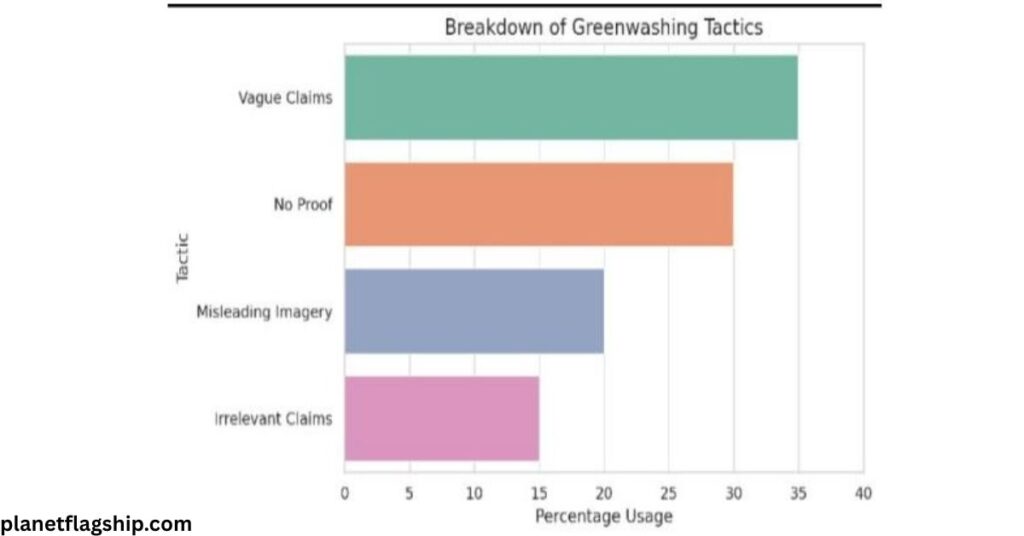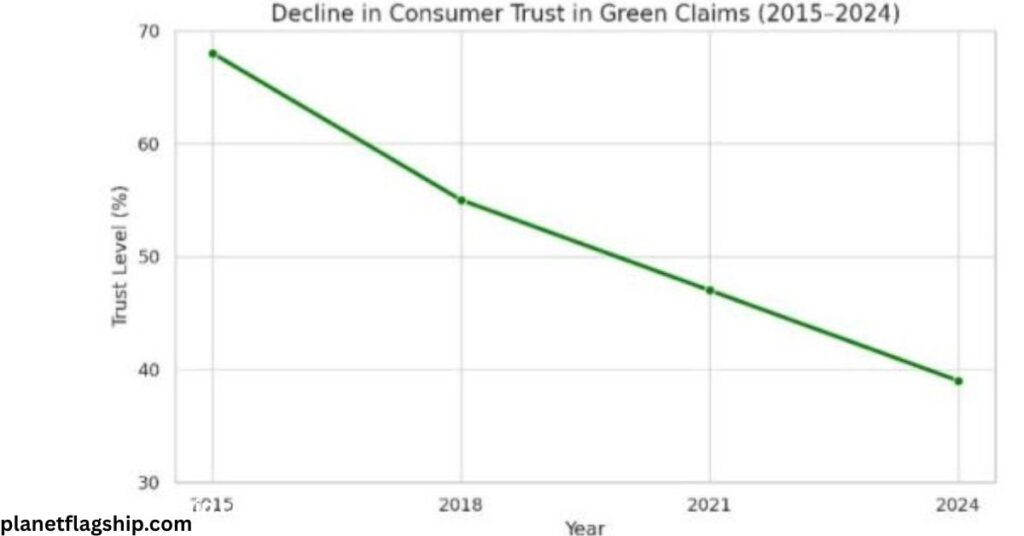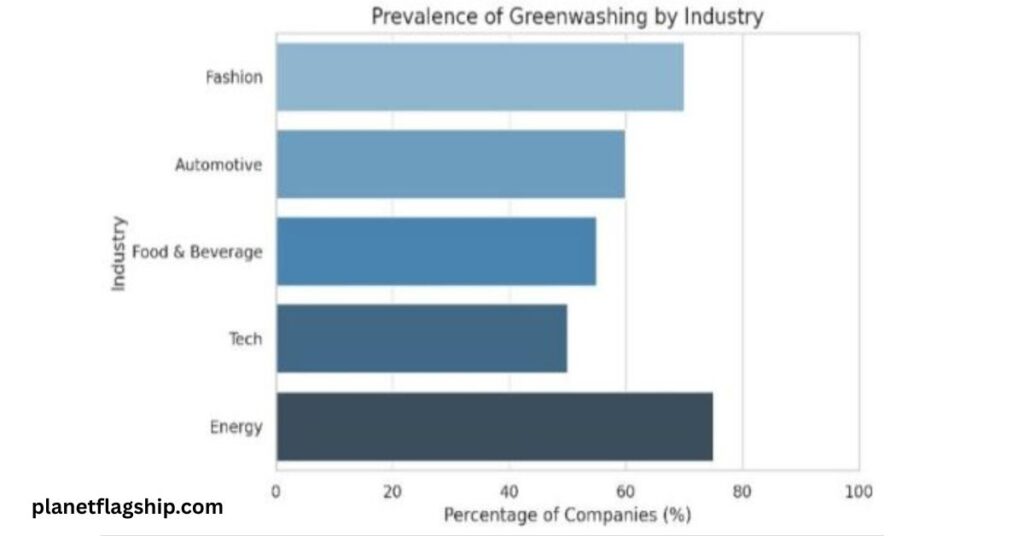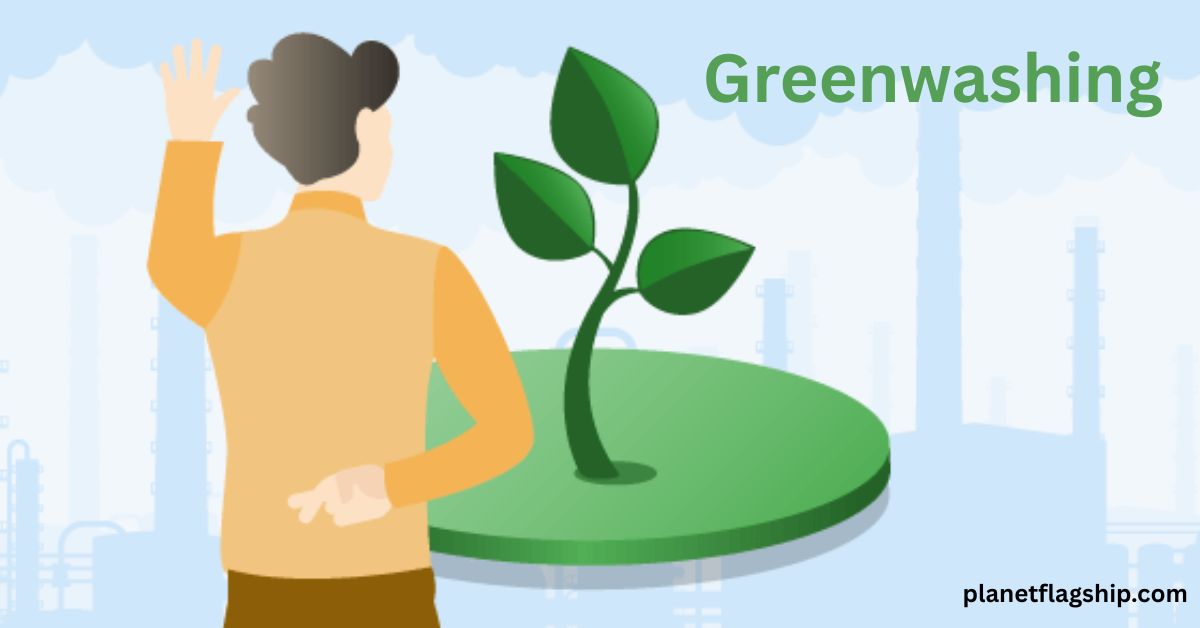Introduction
In today’s eco-conscious world, consumers increasingly seek products and services that align with sustainable and environmentally friendly practices. Companies recognizing this shift often market their offerings with “green” labels and eco-friendly claims. However, not all such claims are genuine. The practice of “greenwashing” involves presenting a false impression or providing misleading information about how a company’s products are more environmentally sound than they truly are. This deceptive marketing strategy can mislead consumers, erode trust, and hinder genuine sustainability efforts.
Recent studies highlight how prevalent greenwashing is. For instance, a 2024 report indicates that greenwashing claims have misled 98% of consumers, and 52% believe that most companies exaggerate their environmental efforts. Such practices hinder progress toward true sustainability by creating confusion and skepticism.
This assignment reviews the concept of greenwashing, exploring how it misleads consumers about sustainability. It examines the tactics companies employ, the psychological impact on consumers, the broader implications for genuine sustainable practices, and the regulatory measures in place to combat such deception. By understanding the nuances of greenwashing, consumers can make more informed choices, and stakeholders can advocate for greater transparency and accountability in environmental claims.
Understanding Greenwashing
Greenwashing refers to the act of conveying a false impression or providing misleading information about how a company’s products are more environmentally sound than they truly are. The term combines “green,” symbolizing environmentalism, and “whitewashing,” showing deception. It was first coined in the 1980s when hotels encouraged guests to reuse towels under the guise of environmental conservation, while the primary motive was cost-saving.
ALSO READ: Why Sustainable Investing Is the Future of Global Finance
Common Greenwashing Tactics
Making vague or generic claims using terms like “eco-friendly,” “natural,” or “green” without clear definitions or established standards. If a product or service makes grand claims without explaining their meaning, it might be greenwashing. For instance, if a product claims to be “sustainable” but lacks certifications or clear evidence, its worth being skeptical.
By highlighting one environmentally friendly attribute, other harmful aspects are ignored. Sometimes, companies make technically true but irrelevant claims. For example, advertising a product as “CFC-free” when CFCs have been banned for decades does not add real value. These claims can mislead consumers into thinking a product is more environmentally friendly than it is.
Making claims without providing accessible evidence or third-party certification, as there is a lack of proof or certification. Third-party certifications usually back authentic green claims. Labels such as USDA Organic or Green Seal provide credibility. It might be greenwashing if a company claims to make its products with organic materials but does not show certifications.
Misleading imagery: using nature-related images to imply environmental friendliness without providing supporting evidence.
Hidden Trade-offs: Emphasizes one positive aspect while ignoring other environmental harm. Certain companies emphasize positive change while disregarding the negative impacts. For instance, a company may promote the use of recycled materials, yet its environmental practices remain harmful. This selective disclosure can mislead consumers about the true sustainability of a product or service.
Breakdown of Greenwashing Tactics:

Impact on Consumer Behavior
Greenwashing has real consequences for how consumers perceive and act upon sustainability claims.
Erosion of Trust
Consumers become skeptical when they uncover exaggerated environmental claims. This erosion of trust can extend beyond the offending company, casting doubt on genuine sustainable products and initiatives.
Studies reveal that only 48% of consumers trust brands that claim to be environmentally friendly, and 65% believe companies exaggerate their sustainability efforts.
Informed Decision-Making
Greenwashing hampers consumers’ ability to make informed choices. Believing they are supporting sustainable practices, consumers may inadvertently support companies that do not align with their environmental values.
Confusion and Skepticism:
Approximately 60% of consumers struggle to understand the environmental impact of products due to greenwashing, leading to skepticism and decreased engagement with genuinely sustainable products.
Altered Purchasing Habits:
Approximately 44% of consumers will pay more for a sustainable product they believe is genuine, indicating that trust plays a crucial role in purchasing decisions.
Decline in Consumer Trust in Green Claims (2015–2024)

3. Case Studies: Industries with High Greenwashing Incidents
1) Fashion Industry
Brands like H&M and Zara promote conscious lines using partially recycled materials, yet they often rely on fast fashion models with high waste and carbon emissions. According to the Changing Markets Foundation, over 60% of sustainability claims in fashion are misleading.
2) Aviation Sector
Airlines advertise using Sustainable Aviation Fuels (SAFs), but most emissions continue from regular jet fuel. The EU flagged several misleading advertisements from airlines in 2023.
Airlines have faced scrutiny over their environmental claims:
In 2024, Qantas faced a greenwashing complaint regarding its “carbon neutral” claims, with critics arguing that the airline’s offset programs were insufficient and misleading. Similarly, Virgin Atlantic’s advertisement about sustainable aviation fuel was banned for creating a false impression of environmental benefits.
3) Energy Companies
Major oil companies such as BP and Shell are promoting clean energy investments. However, reports indicate that less than 5% of their budgets go toward renewables, while the rest continues in fossil fuel expansion.
Graph 3: Prevalence of Greenwashing by Industry

Popular International Companies Facing Greenwashing Allegations
Numerous companies face allegations of greenwashing, which mislead consumers about their true environmental impact. These brands often use deceptive marketing to enhance their image. They do this without making large efforts to address environmental issues. Below are five well-known international brands accused of doing so.
1. Volkswagen
Volkswagen faced a major greenwashing scandal a few years ago. In 2015, it was found that they had installed software in diesel vehicles to cheat emissions tests. They promoted their cars as low-emission and eco-friendly. But cars were emitting pollutants above legal limits. This scandal damaged their reputation and highlighted the need for stricter regulations on sustainability claims.
- McDonald’s
McDonald’s has been accused of greenwashing by promoting its switch to paper straws. Critics argue that focusing on small, visible changes distracts from bigger issues like waste and carbon emissions. This creates a misleading perception of the company’s environmental impact.
- Lufthansa
Lufthansa has faced accusations of greenwashing over its “Green Fare” flights. These pricier tickets include 100% carbon offsetting. However, critics argue that this creates a false sense of security for passengers. They argue that offsetting measures, including the use of sustainable aviation fuels and contributions to climate protection projects, cannot adequately mitigate the environmental impact of flying. This controversy highlights the ongoing challenges. Achieving genuine sustainability in the aviation industry remains difficult.
- IKEA
IKEA has been criticized for greenwashing its wood sourcing. The company claims to use sustainable materials. However, investigations have found instances of illegal logging and unsustainable forestry practices. These findings challenge IKEA’s sustainability claims and highlight the importance of transparency and accountability in environmental reporting.
- Starbucks
Starbucks has faced greenwashing allegations for introducing strawless lids. These lids were marketed as environmentally friendly, yet they used more plastic than the previous straw and lid combination. Additionally, the company has been accused of making false claims about the ethical sourcing of its coffee. These issues raise questions about the authenticity of Starbucks’ sustainability efforts.
Regulations and Global Guidelines
Governments and international bodies are taking action:
1. FTC Green Guides (USA)
The FTC’s Green Guides guide marketers in making truthful and substantiated environmental claims. They emphasize the need for clear definitions, evidence-based assertions, and the avoidance of misleading terms.
2. European Union Green Claims Directive
The EU has introduced the Green Claims Directive, requiring companies to substantiate their environmental claims with scientific evidence. This move aims to prevent deceptive marketing and to ensure consumers receive accurate information.
3. Canadian Competition Bureau
In 2024, the Competition Bureau updated its policies to penalize unverified green claims. Canada’s Competition Bureau has updated its guidelines, mandating businesses to have proper testing or substantiation to support environmental claims. This step aims to curb deceptive practices and promote genuine sustainability efforts.
4. ISO 14021 Standards
ISO 14021, which is an international standard, outlines acceptable self-declared environmental claims and promotes transparency and accountability.
Strategies for Combating Greenwashing
Consumer Awareness
Educating consumers about greenwashing tactics can empower them to assess environmental claims critically. Awareness campaigns and informational resources can play a pivotal role in this endeavor.
Third-Party Certifications
Encouraging companies to obtain certifications from reputable organizations can enhance credibility. Labels like ENERGY STAR, USDA Organic, and Fair Trade assure genuinely sustainable practices.
– Use apps that verify green claims (e.g., Good on You).
Policy Enforcement
Governments and regulatory bodies must enforce existing guidelines and impose penalties for deceptive practices. Regular monitoring and swift action against violators can deter greenwashing.
Standardization
Developing standardized criteria for environmental claims can reduce ambiguity and prevent misuse.
READ MORE: Rewilding to Save the Planet: Can Restoring Nature Really Work?
FAQs on Greenwashing and Consumer Deception
What is greenwashing in simple terms?
Greenwashing is when companies make false or exaggerated claims about being environmentally friendly. They use words like “eco-friendly” or “sustainable” without proof or certification to attract eco-conscious buyers. The goal is to appear responsible without making real environmental improvements.
How does greenwashing mislead consumers about sustainability?
Greenwashing tricks consumers into believing they are supporting sustainable practices when they are not. Misleading labels, vague claims, and nature-inspired imagery create the illusion of eco-responsibility. This deception discourages genuine environmental progress and erodes trust in authentic green products.
Which industries are most guilty of greenwashing?
Fashion, energy, aviation, and food industries are frequent offenders. Fast fashion brands market “conscious collections,” oil companies highlight small renewable projects, and airlines promote “carbon neutral” flights. However, their main operations often remain environmentally damaging, making these claims misleading.
How can consumers identify greenwashing?
Consumers should look for specific evidence such as third-party certifications (e.g., ENERGY STAR, Fair Trade, USDA Organic). Be cautious of vague language like “all-natural” or “eco-safe.” Research company practices, check sustainability reports, and use credible apps like Good on You to verify claims.
What can be done to stop greenwashing?
Combating greenwashing requires collective effort. Governments must enforce regulations like the FTC Green Guides and the EU Green Claims Directive. Companies should ensure transparency and verify claims through independent audits. Meanwhile, consumers can drive change by supporting genuinely sustainable brands and holding deceptive companies accountable.
Conclusion
Greenwashing undermines genuine sustainability efforts by misleading consumers and eroding trust in environmental claims. As companies vie for market share in an eco-conscious landscape, the temptation to exaggerate or fabricate green credentials grows. However, such practices not only deceive consumers but also hinder progress towards a more sustainable future.
To combat greenwashing, a multi-faceted approach is essential. Consumers must be educated to recognize and question dubious claims. Companies should commit to transparency, seek third-party validation, and adhere to established sustainability standards. Regulatory bodies must enforce guidelines and penalize deceptive practices to maintain market integrity.
Consumers, accountable corporations, and vigilant regulators can collectively foster an environment where genuine sustainability thrives, and greenwashing becomes a relic of the past.
References
- WorldMetrics. (2024). Greenwashing Statistics: Consumer Deception, Environmental Impact, and Market Growth. Retrieved from https://worldmetrics.org/greenwashing-statistics/
- The Guardian. (2024). Is it really possible to fly ‘carbon neutral’ with Qantas? Retrieved from https://www.theguardian.com/business/2024/oct/16/qantas-greenwashing-complaint-accc-carbon-neutral-tickets
- The Times. (2024). Virgin Atlantic ad banned over sustainable fuel claim. Retrieved from https://www.thetimes.co.uk/article/virgin-atlantic-ad-banned-over-sustainable-fuel-claim-gdvgjt8fp
- Financial Times. (2024). TotalEnergies to appeal landmark greenwashing ruling in South Africa. Retrieved from https://www.ft.com/content/16a8fcc0-5e75-4493-b775-9bc4876b72b9
- Federal Trade Commission. (2022). Green Guides Summary. Retrieved from https://www.ftc.gov

John is a professional blogger and passionate advocate for environmental sustainability. With years of experience exploring eco-friendly practices and green innovations, he shares insightful articles on Planet Flagship to inspire a sustainable future. John’s expertise lies in making complex environmental topics accessible and actionable, empowering readers to make meaningful changes for the planet.
